May 21, 2025 | 05:46 GMT +7
May 21, 2025 | 05:46 GMT +7
Hotline: 0913.378.918
May 21, 2025 | 05:46 GMT +7
Hotline: 0913.378.918
Binh Dinh Province has a strong forestry sector in the central region, which is attributed to the use of quality seedlings by the majority of forest growers.
The locality now has about 146 units of production and trading of forest tree varieties in operation. Classified by type of business registration, they include 24 enterprises, 4 non-business units and 118 production facilities, in which, there are 3 units having tissue culture houses that produce hybrid acacia and eucalyptus varieties, with the main focus being the U6 line.
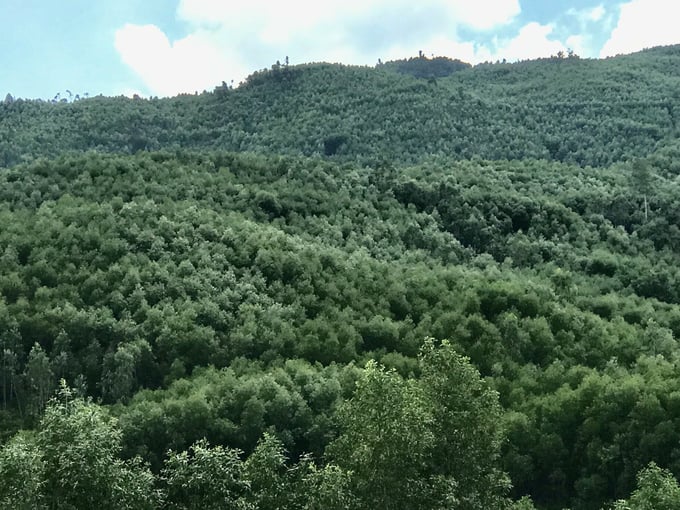
Dense forests planted in Phuoc My (Quy Nhon city, Binh Dinh). Photo: V.D.T.
Regarding seed sources, Binh Dinh has 153 leading gardens covering an area of over 44ha that provide hybrid acacia cuttings. The quality of forestry seedlings produced in Binh Dinh is not only trusted by forest growers in the province, but also those in the Central and Central Highlands region, Laos and Cambodia.
The number of forestry seedling production in Binh Dinh increases year by year. For example, the province produced only nearly 124 million trees were produced (of which acacia hybrids were cut more than 116 million trees, tissue transplants were nearly 8 million trees) in 2019, but the number of forest varieties produced in the province increased to nearly 159 million trees, including 152 million acacia hybrids and 7 million acacia tissue hybrids, in 2020. In 2021, forestry seedling production in Binh Dinh increased to nearly 163.6 million trees, of which acacia hybrids were 151.4 million trees and acacia hybrids were over 12.2 million trees.
Binh Dinh is evaluated as one of the provinces with excellent state management of forestry seed production and trading, especially the implementation of granting and destroying seed sources when upon expiration. As a result, forestry seedlings produced in Binh Dinh are trusted and highly appreciated by forest growers everywhere. However, poor quality forest tree varieties are still existent on the market, although they are few. This situation can leave a bad impression on an otherwise model image.
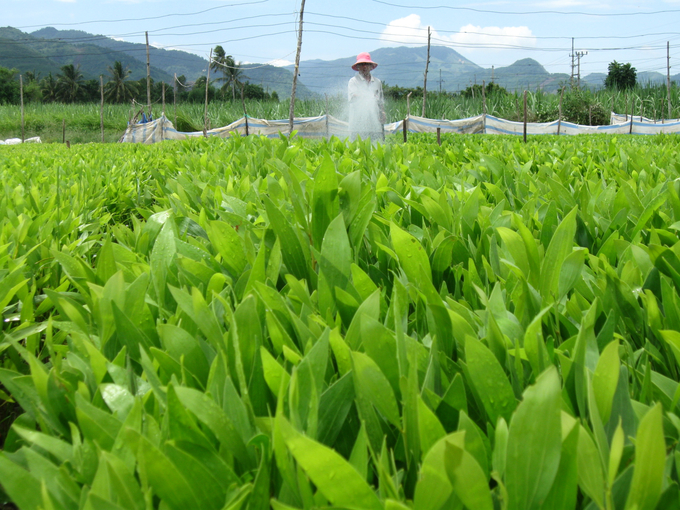
Binh Dinh currently has about 146 units operating in production and trading of forest tree varieties. Photo: V.D.T.
According to Nguyen Ngoc Dao, Chairman of Song Kon Forestry Company Limited (Vinh Thanh District, Binh Dinh), the aforementioned problems stem from the rushed type of forestry plant seed production facilities. For Acacia hybrid cuttings, cuttings from top-of-the-line orchards do not meet the technical requirements; parent gardens have been neither certified nor cared for and cleaned well; gardens are infected with diseases; cutting cuttings is not guaranteed, among others. All of these issues will lead to poor quality seedlings.
He added that forest growers are attracted to buy poor quality seeds due to their cheap price, or type 2 and type 3 seedlings that have been rejected through intermediaries. Forest trees are long-term varieties so it might take up to 4 years for the forest owners to realised that they have bought poor quality seedlings. By that time, there are no papers to trace the origin; nor can forest growers remember where they bought the seedlings from to report to the respective authorities.
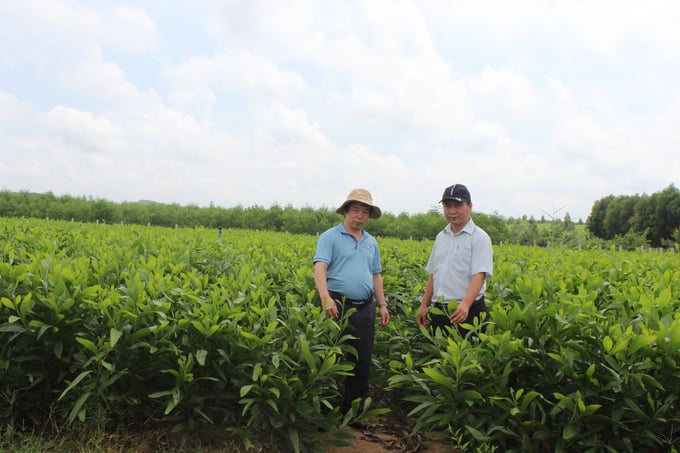
Nguyen Ngoc Dao, Chairman of Song Kon Forestry Company Limited, Vinh Thanh District, Binh Dinh, at the company's seedling farm. Photo: V.D.T.
“When planting acacia hybrid, forest growers should order seedlings from 2 or more lines to prevent the risk of pests and diseases. The currently planted lines are AH1, BV75; BV33, BV32, AH7 and so on. Forest seedlings should be purchased from a registered business unit with a recognized seed source.
When buying seedlings, forest growers must ask the seed seller to issue an invoice or an ex-warehousing note for traceability. If growers purchase seedlings through an intermediary, it is necessary to have an ex-warehousing note from the seed seller, specifying the type of tree, and the forest growers should contact the seed production unit to confirm such information", explained Nguyen Ngoc Dao.
In fact, in the period 1995 - 2000, Binh Dinh strongly developed the afforestation movement. However, the was a lack of concern about the quality of seedlings and seedlings were produced from seeds, so the productivity and quality of planted forests were low, leading to low afforestation efficiency.
Since 2000, the province has implemented the project on development of forest tree varieties for the period 2001 - 2010; while formulating and promulgating state management documents on forestry seed work in the province, equipping and improving knowledge for managers and professional staff on forestry seed work. The province also built basic and essential technical facilities for seedling production; selection of varieties, development of seed sources for seedling production by cuttings and tissue culture.
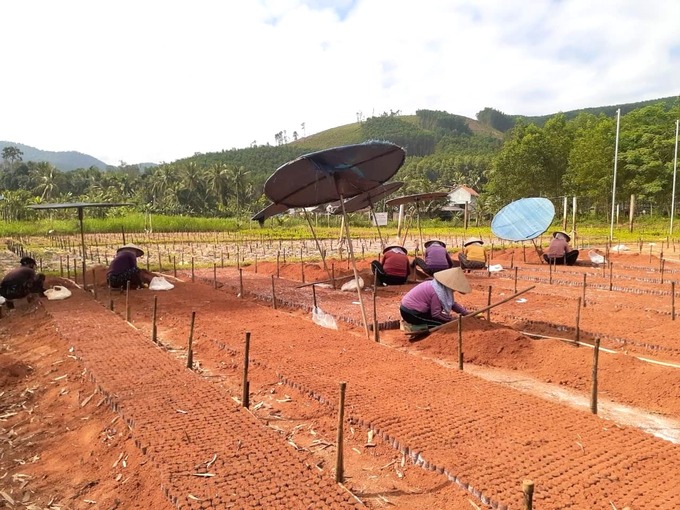
The growing medium in the forest seed pot is soil, so transporting it to the forest is a heavy task, which requires lot of effort to make potting and transport. Photo: V.D.T.
Since then, the management, production and trading of forest tree varieties in Binh Dinh have gradually come into order, and the quality of planted forests has been markedly improved. Up to now, the average productivity of planted forests in Binh Dinh has reached 120 - 140m3/ha/cycle (from 6 to 7 years), doubled compared to the 2000s with a yield of only 60 - 70m3/ha/cycle (6 to 7 years).
With the goal of planting over 30,000ha of large timber forests by 2025, Binh Dinh has given top priority to the management of forest tree varieties and the research of new varieties. State management agencies in forestry in Binh Dinh have strengthened the management of certified seed sources, quality control of seeds along the value chain; and most importantly, the original seed sources put into production by the tissue culture method, and the leading garden seedling source to provide cuttings.
In addition, Binh Dinh has also strengthened support for seed production units; organized trainings, seminars, and capacity building of forestry plant varieties for district-level state management units and forestry seed production establishments in the province. The locality has also guided seed production units in chain management of the main forest tree species to ensure traceability, improve the quality of plant seed management and production.
Song Kon Forestry Co., Ltd., is a state-owned unit that serves the public interest as well as trades in planted forests and forestry seedlings. However, according to Mr. Nguyen Ngoc Dao, Chairman of the company, this company only produces approximately 1 million forestry seedlings every year to serve the company's afforestation.
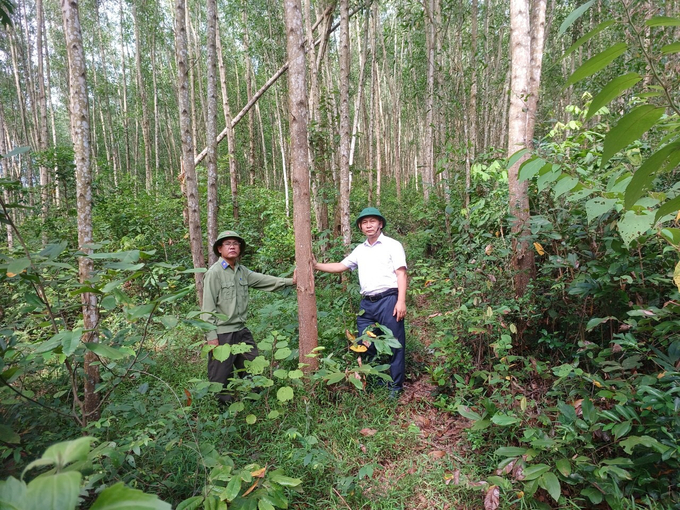
Quality forest tree varieties enable the forests to avoid pests and diseases, and grow quickly. Photo: V.D.T.
According to him, there are currently 146 well-organized units specializing in the production of forestry seeds, so Song Kon Forestry Co., Ltd. does not aim to compete in the field of seedling production, and instead will focus on collecting new seedlings for trial production to serve the company's afforestation as well as the forest growers in the province.
Over the years, Song Kon Forestry Co., Ltd. has conducted many research projects and built many new varieties testing models. Since 2019, the company has carried out 2 provincial projects; implementation of comparative models of acacia hybrids, community forest management, medicinal plants and large timber plantations. In the coming time, the company will continue to build a large timber forest transformation model and an effective comparison model of forest tree varieties and forest care techniques.
“Forestry plant seed production facilities are currently operating manually, with soil as the growing medium, so it is an arduous task to transport to the forest, and it takes a lot of effort to make potting and transport. In the near future, the company will research to change the growing medium in planting forest seeds and restructure the farm. The company's activities will focus on three main pillars: Economy, environment and society, with technical support to help forest growers achieve higher efficiency from the forest economy", emphasized Nguyen Ngoc Dao.
Translated by Phuong Ha

(VAN) Japan's grant aid project contributes to capacity building, promoting organic agricultural production, and fostering sustainable community development in Dong Thap province.

(VAN) For years, the CRISPR-Cas9 genome technology has been reshaping genetic engineering, a precision tool to transform everything from agriculture to medicine.

(VAN) Vietnam aims to become a 'leader' in the region in the capacity and managing effectively soil health and crop nutrition.
![Reducing emissions from rice fields: [Part 1] Farming clean rice together](https://t.ex-cdn.com/nongnghiepmoitruong.vn/608w/files/news/2025/05/05/z6509661417740_a647202949c539012a959e841c03e1d3-nongnghiep-143611.jpg)
(VAN) Growing clean rice helps reduce environmental pollution while increasing income, allowing farmers to feel secure in production and remain committed to their fields for the long term.
/2025/05/19/5136-1-144800_230.jpg)
(VAN) The Nghe An Provincial People's Committee has just approved the list of beneficiaries eligible for revenue from the Emission Reductions Payment Agreement (ERPA) in the North Central region for the year 2025.

(VAN) 14 out of 35 domesticated elephants in Dak Lak province have had their living conditions improved, with 11 of them currently participating in the non-riding elephant tourism model.

(VAN) Muong Nhe Nature Reserve hopes that being upgraded to a national park will lay the foundation for forest protection efforts to be carried out in a systematic, modern, and sustainable manner.